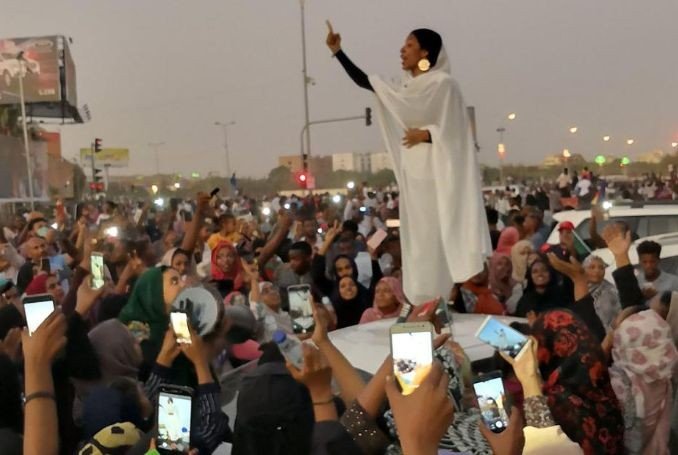
Rape as a Weapon: UN Must Investigate Reports of Sexual Violence Against Female Protesters in Sudan
By Maya Garner
Last week, doctors recorded more than 70 cases of rape during an attack on a sit-in protest outside army headquarters in Khartoum, Sudan. The attack was carried out by the paramilitary group Rapid Support Forces. The United Nations Special Representative on Sexual Violence in Conflict, Pamilla Patten, expressed “grave concern” on Thursday and called for an “immediate and complete” end to the violence. Yet the UN Security Council still needs to enact effective measures of rape prevention, and must acknowledge the full realities of the sexual violence as a military tactic and a weapon of war.
The statement issued by the office of the UN Special Representative highlighted the horrid human rights atrocities that have been reported in Sudan since the beginning of this month. After the ousting of the then president Omar al-Bashir in April, the military took power. Demonstrators have demanded immediate civilian rule, which has since been rejected by the Transitional Military Council, which pushes for a transitional power-sharing arrangement. Millions of people in Sudan have joined a general strike, declared by a pro-reform group. Protesters have been shutting down city centers across the country. The strikes and direct actions are calling for the new military leadership to resign. On June 3rd, outside army headquarters in Khartoum, Security forces and paramilitaries fired on the pro-democracy protesters. 100 people were killed and 700 injured. Additionally, there were more than 70 cases of recorded rapes, which may be an underestimate. The Rapid Support Forces (RFS) is a paramilitary group operated by the Sudanese government, composed primarily of the Janjaweed and other militias.
With women mobilizing and emerging at the forefront of the protests against Bashir, and continuing to take part of political action against the milita in the call for democracy, it becomes evident of the usage of rape as a specific political tactic. While it is a given that rape can be perpetrated toward both men and women, with many cases of rape against men being reported in Sudan, it is deliberately designed to target women, and importantly, women demonstrators. The UN Special Representative specifically noted the reports of rapes and gang rapes committed by the RSF against female protestors, human rights defenders, and women medical personnel near the sit-in protest. This assessment transforms the traditional narrative of women being victims of rape simply as a result of military culture and wartime, and instead allows the international community to see these women as people with political agency, who are now being specifically targeted through the cruel and misogynistic military tactic of rape. What degree of planning and organization are in place, what kind of culture of impunity or deliberation exists, and how far up the chain of command this tactic can be traced, are questions for the UN to implore, investigate, and make clear to the world.
The UN Special Representative Patten stated that she demands “the immediate and complete cessation of all violence against civilians including sexual violence,” noting that the RFS had been listed in the annual report of UN Secretary-General on conflict-related violence. Patten highlighted “the weakness of the rule of law and a general climate of impunity.” She called on the international community and members of the UN Security Council to make use of “all possible diplomatic channels with leaders of Sudan to pave the way for a swift transition to a civilian administration and an end to all forms of violence and intimidation against civilians,” and called for “effective measures to prevent and punish sexual violence in accordance with relevant Security Council resolutions, including resolution 2467.”
UN Resolution 2467 was adopted by the UN Security Council in April this year, marking the ten-year anniversary of UN Resolution 1888, which created the mandate of the Special Representative on Sexual Violence in Conflict. Russia and China abstained from the vote, and those countries had previously opposed the draft resolution’s proposal to establish a specific committee to monitor and report on sexual violence in conflict. This important part was therefore not included in the final resolution. Additionally, the U.S. threatened to veto the resolution over the inclusion of language that aimed to secure access to reproductive healthcare facilities for women who had suffered from rape in war. As a result, the resolution was watered down and omitted the mention of ensuring easy access to reproductive facilities in the aftermath of rape from violence. Such opposition from three permanent members of the Security Council places limits on the possibilities for protecting women from sexual violence. Aside from displacement, intimidation, and the spread of disease, by omitting references to accessing sexual reproduction facilities, the Council ignored one of the key aspects of the rape, the resulting pregnancies, which only affects female bodies.
The UN Security Council has a responsibility to listen to the Special Representative and protect the women in Sudan against sexual violence and is obliged to reinstate the proposal from the draft of resolution 2467 calling for the establishment of a new monitoring and reporting group on sexual violence in conflict. Additionally, reproductive healthcare needs to be made available to those who do not have it in areas of conflict, so that the consequences of the rape can be diminished. In response to the reports of rape in Sudan, and the evident political nature and targeting of women activists and healthcare workers, the UN must be obliged to take on an independent investigation into the nature of planning and deliberation involved in the rapes in Sudan, considering factors of impunity, military culture and environments, as well as direct targeting of women to silence their political agencies.


